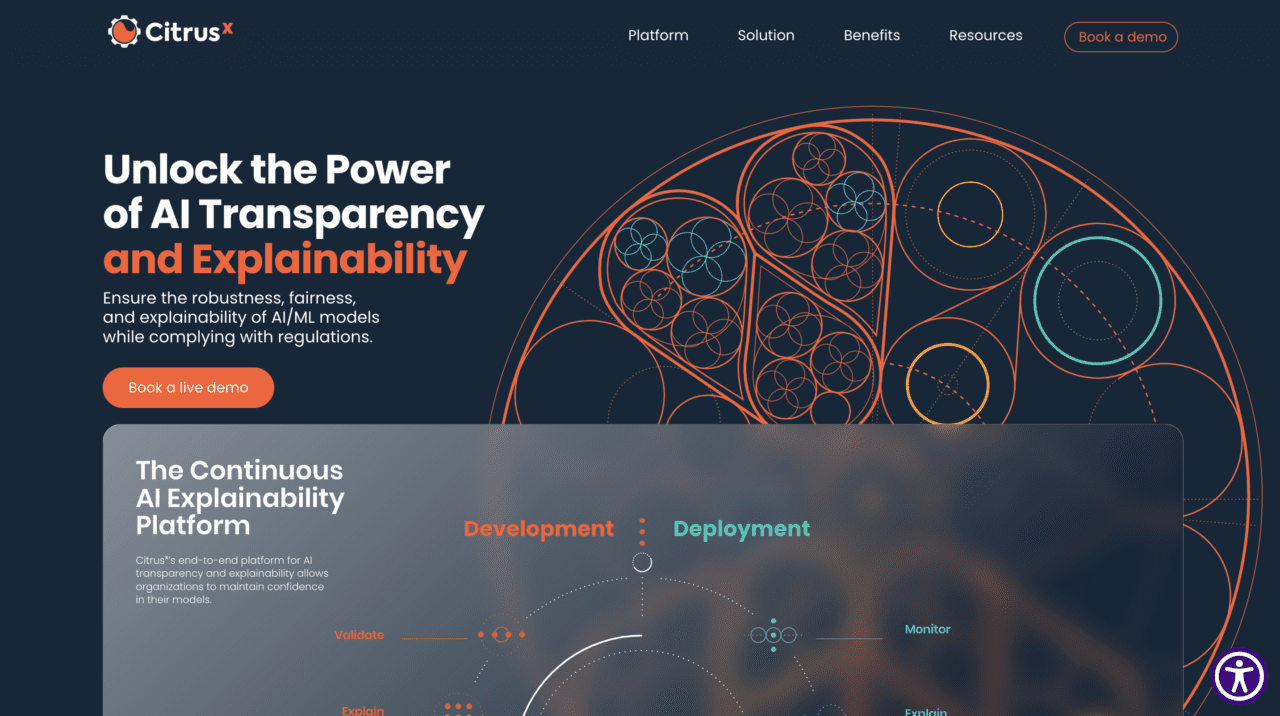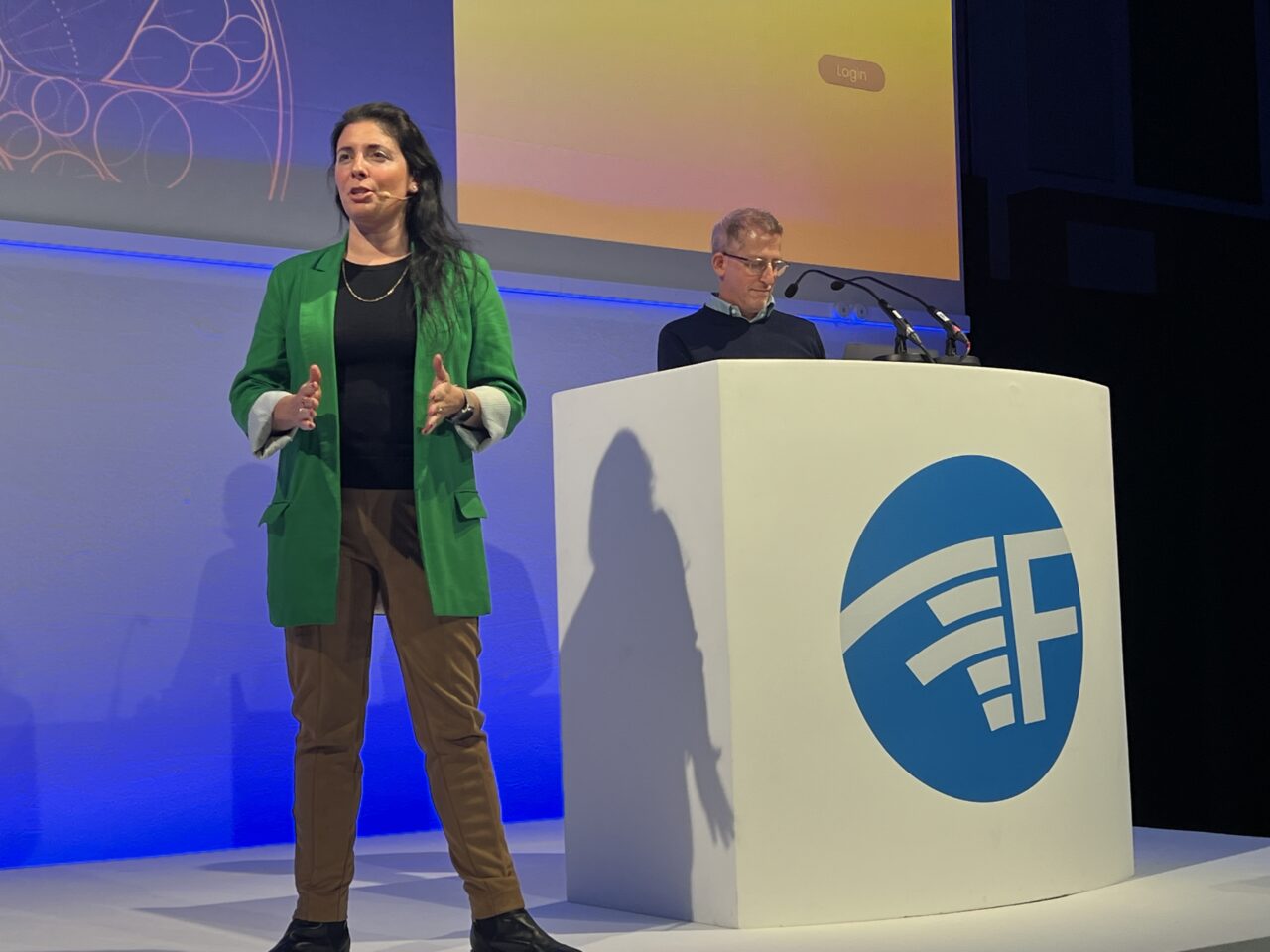
The question of deploying AI technology in fintech and financial services is no longer a question of “if” – or even “when.” As our recent spring fintech conference confirmed, innovators and entrepreneurs across our industry have already decided that the answer to both of those questions is “yes” and “now.”

But there are hurdles and challenges for fintechs and financial services companies as they seek to deploy AI in their products and offerings. Unlike other industries, fintechs and financial services companies operate in a high-risk environment where issues of trust, transparency, and explainability – to say nothing of regulatory oversight – are virtually existential.
Earlier this year at FinovateEurope in London, Israel-based Citrusx demoed its platform that enables all stakeholders in the AI pipeline to remain in the loop and benefit from 100% transparency in their models.
We caught up with Citrusx’s VP of Business Development Michal Berdugo (pictured) to talk about the company, how it helps businesses effectively deploy AI technology, and what we can expect from the company in the near future.
What problem does Citrusx solve and who does it solve it for?
Michal Berdugo: In today’s data-driven world, everyone wants to adopt AI for various use cases, but they often face many roadblocks. In high-risk industries, the primary obstacles are a lack of understanding and trust. When key decision-makers can’t trust their AI systems it can lead to potential reputational and regulatory damages.
Citrusx comes in to help financial institutions and other organizations in highly regulated industries speed up their time to production while ensuring their models are accurate, robust, explainable, fair, and comply with regulatory requirements.
How does Citrusx solve this problem better than other companies or solutions?
Berdugo: High-risk sectors such as banks, loan providers, and credit unions, face unique challenges in adopting AI solutions. The lengthy production timelines and the inherent opacity of AI systems leave these companies vulnerable to liability issues. Without transparency, they are unable to fully understand or explain AI-driven decisions, heightening their exposure to legal and regulatory risks.
Citrusx’s patent-pending technology delivers real-time insights, accurate explanations, and critical validation measurements throughout the development cycle and offers proprietary monitoring and prediction methods, making it model-agnostic and resilient to feature correlation problems. Citrusx empowers businesses to build trust and deploy AI responsibly, unlocking its full potential.
Who are Citrusx’s primary customers? How do you reach them?
Berdugo: Citrusx attracts risk leaders and data science leaders who are actively seeking innovative solutions. These forward-thinkers are constantly on the lookout for ways to mitigate risks and maintain compliance with regulations. Peer recommendations validate Citrusx’s effectiveness, while articles featuring insights about us and thought leadership also spark interest.
When these leaders search for cutting-edge tools, Citrusx naturally emerges as a preferred option. Additionally, understanding the unique challenges in high-risk industries such as finance and insurance allows us to effectively address their specific pain points. To explore how Citrusx can benefit your organization, reach out to us directly via our website and book a demo.

Can you tell us about a favorite implementation or deployment of your technology?
Berdugo: One of the Big Five banks in Canada approached us because they wanted to deploy an AI model, but finding a way to make it explainable while complying with regulations was a challenge. When models become more complex, understanding their decision-making processes and fostering accountability and trust in the outcomes becomes difficult. Additionally, without any transparency of the rationale of the model, it can cause vulnerabilities and biases to slip through the cracks, which could lead to reputational and regulatory damages.
To help them combat these issues and build a robust, explainable, and fair model, we provided them with a framework to explain the inner workings of their model accurately. Using proprietary explainability methods, we gave them the tools to see the model’s results on a global and local level, yielding a full report of each sample in their dataset.
With our help, the bank achieved a deeper level of understanding of their model, giving them the trust to finally put them in deployment! All stakeholders, including those who are non-technical, were able to understand the model’s decisions, allowing them to approve it faster with confidence.
Instead of taking six to nine months to deploy their model, we cut the time in half. We also gave them the assurance that their models remained compliant with regulations.
What in your background gave you the confidence to tackle this challenge?
Berdugo: Based on my experience, I gained an understanding of the significant gap companies in the financial sector are facing. While organizations want to keep pace, they are falling behind because of regulations. On top of that, there is a lack of transparency and trust in their models. At Citrusx, we had the confidence to take on this problem because we onboarded a global bank as our first main customer. With our combined backgrounds in the financial sector, government, and AI/ML development, we had the tools to build the best solution for our clients and potential clients.
What is the fintech ecosystem in Israel like? What is the relationship between fintechs, banks, and traditional financial services companies in the country?
Berdugo: Israel’s fintech ecosystem is thriving, boasting a high number of startups creating innovative financial solutions for a relatively small population. There are roughly 550 fintech startups in Israel, and 20 of those companies are valued at over $1 billion. This makes Israel a major player in fintech on a global scale.
The relationship between fintechs, banks, and traditional financial institutions in Israel is evolving. There’s both competition and collaboration. Banks are partnering with fintechs to improve their digital offerings and reach new customers, while fintechs benefit from the banks’ established infrastructure and customer base. This symbiotic relationship helps both sectors grow and provide better financial services in Israel.
You demoed at FinovateEurope earlier this year. How was your experience?
Berdugo: The experience was great, as it was the first conference we participated in since launching from stealth. We were excited to share more about our product and the crowd was incredibly receptive. We gained many interesting insights about what different stakeholders in the AI pipeline are focused on in the coming quarters. The Finovate team was also very helpful and gave us great feedback in preparation for the demo.
What are your goals for Citrusx? What can we expect to hear from you in the months to come?
Berdugo: We are signing new clients and working on growing and expanding our product and team in the coming year. We are working toward a time when Citrusx’s solutions will be a standard practice.
